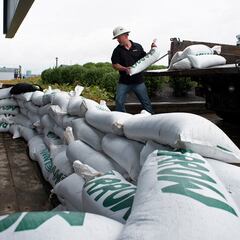Could Atlantic hurricane season activity increase in September? Expert predictions
The NOAA had projected a high-than-average frequency of named storms this year but very few have so far materialised.


The Atlantic hurricane season officially last from 1 June to 30 November, meaning they we should now be in the midst of the busiest period of hurricane activity in the United States. However, despite warnings of above-average activity this year, there has been relatively little incident.
The last named storm (winds of 39 mph or greater) in the Atlantic basin was Colin on 3 July, a minor swirl that flirted with the Carolina coastline with no real impact. But as we approach September, the month when activity has peaked historically, there are warnings that a major reversal could be in store.
Projections published earlier this month by the National Oceanic and Atmospheric Administration (NOAA) and Colorado State University suggest that there is a 60% chance of an above-normal number of named storms this year.
If that were to be the case then it would be the seventh consecutive year in which the number of hurricane has exceeded normal levels. NOAA outlines a number of reasons that have contributed to the increased frequency of storms and informed their projections:
- La Nina, the strong winds pushing arm water towards Asia and promoting upwelling on the west coast of the Americas
- Warming sea surface temperature in the Atlantic and Caribbean
- A weakening of tropical trade winds in the Atlantic
- Above-average West Africa monsoons
A study published in Nature Communications on Tuesday links an earlier Atlantic hurricane season to warming ocean temperatures, finding that every decade since 1979 has seen the first storms of each hurricane season shift earlier by about 5 days. pic.twitter.com/UhPC8RSBUO
— NowThis (@nowthisnews) August 17, 2022
What are the experts’ predictions for hurricane season 2022?
They anticipate between 14 and 20 named storms before the end of the season, but so far only three have materialised: Alex, Bonnie and Colin. There has been little sign of the remaining dozen so far but the Federal Emergency Management Agency (FEMA) has reiterated that more storms are likely.
FEMA Administrator Deanne Criswell said: “Although it has been a relatively slow start to hurricane season, with no major storms developing in the Atlantic, this is not unusual and we therefore cannot afford to let our guard down.”
“This is especially important as we enter peak hurricane season -- the next Ida or Sandy could still be lying in wait.”
Tell me Atlantic Hurricane Season is about to let loose without telling me Atlantic Hurricane Season is about to let loose.
— Jesse Ferrell (AccuWeather) (@WeatherMatrix) August 18, 2022
EURO: pic.twitter.com/Bp3IBJkBS5
Related stories
The initial study was carried out in tandem with Colorado State University and Phil Klotzbach, a research scientist there, confirmed that most of the storms typically occur during the second half of hurricane season.
“While we are now two months into the 2022 Atlantic hurricane season, about 90% of all hurricanes and 95% of major hurricanes in the Atlantic occur after the 1st of August, on average,” he said.

